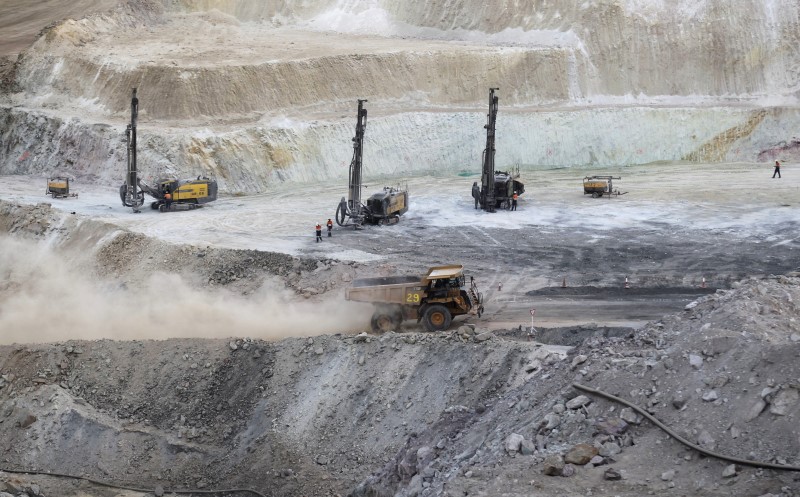By Edmund Blair
ASMARA (Reuters) - Eritrea expects to have four mines in operation by 2018 producing gold, copper, zinc and potash as one of Africa's poorest nations looks to build an industry that can kick-start its economy, a top mining official told Reuters.
Eritrea's artisanal miners have long scratched for gold nuggets on deposits that stretch along the Red Sea, a geological formation known as the Arabian Nubian Shield, but the country currently has just one working commercial mine.
The industry is growing, however. A new gold mine, a joint venture with a Chinese firm, will start commercial production by the end of March, the director-general of the Department of Mines told Reuters.
It will be followed by a mine that will in stages produce gold, copper and zinc, which is expected to start operations by the end of 2017, then a potash mine, Alem Kibreab said in an interview in his office in the capital Asmara.
"In 2018, we will have four mining companies," he said, giving one of the most detailed outlines yet for the development of the industry. "Eritrea is very prospective. It is investor-friendly."
Alem said the government was looking to the nascent industry to boost economic growth in the small Horn of Africa country, which officials say has a population of 3.6 million and that has long relied heavily on remittances from Eritreans abroad for foreign exchange.
"Mining in most countries is used to kick-start the economy," he said.
The government says the threat from Ethiopia, from which it won independence in 1991 and fought a border war in 1998-2000, makes investors wary. The African Development Bank estimates growth in 2015 was 2.1 percent, up from 2 percent a year before, but Eritrea itself does not issue figures.
In mining ventures, the government gets an automatic 10 percent stake free and then usually takes up its right to buy 30 percent more.
HURDLES
Bisha mine in the north of Eritrea, a joint venture between Canada's Nevsun Resources and the state mining firm ENAMCO, is the only mine now in full production.
It began by producing gold in 2011, though output of that metal has since been phased out. As excavations have moved deeper, it has been producing copper and will soon mine zinc.
Based on current reserves, production will continue until around 2025, but further exploration could extend its life. Nevsun says the mine contributed $800 million to Eritrea's coffers in its first five years of operation through taxes, royalties and return on investment.
Eritrea's ambitions to expand its mining industry face hurdles, however, with the planned new projects still needing to raise some capital or debt.
A slide in metals prices over the past five years has made mining less lucrative and left some companies struggling to raise cash to invest in operations.
Meanwhile Bisha has been dogged by allegations from Human Rights Watch, other groups and former workers who are now outside the country, about the use of poorly paid workers on national service when the mine was built. Human Rights Watch and others describe the use of conscripts as "forced labor".
The government and Nevsun deny any national service workers had been used in commercial mining, and the Canadian firm says its own investigations failed to find any evidence of this. Alem also dismissed the allegations. "I don't know why they put on this smear campaign. It is absolutely incorrect," he said.
But some mining executives say companies are wary of investing in Eritrea, partly because it is still new territory for most miners and also due to the worker allegations.
So far Eritrea has attracted only smaller, so-called junior, mining firms - but Alem said: "They are aggressive explorers."
He and firms involved in the new projects say they are confident they will go ahead.

"Great deposits get mined and this is a great deposit," Seamus Cornelius, non-executive chairman of Australia's Danakali, told Reuters about his firm's potash venture which lies near the coast for export.